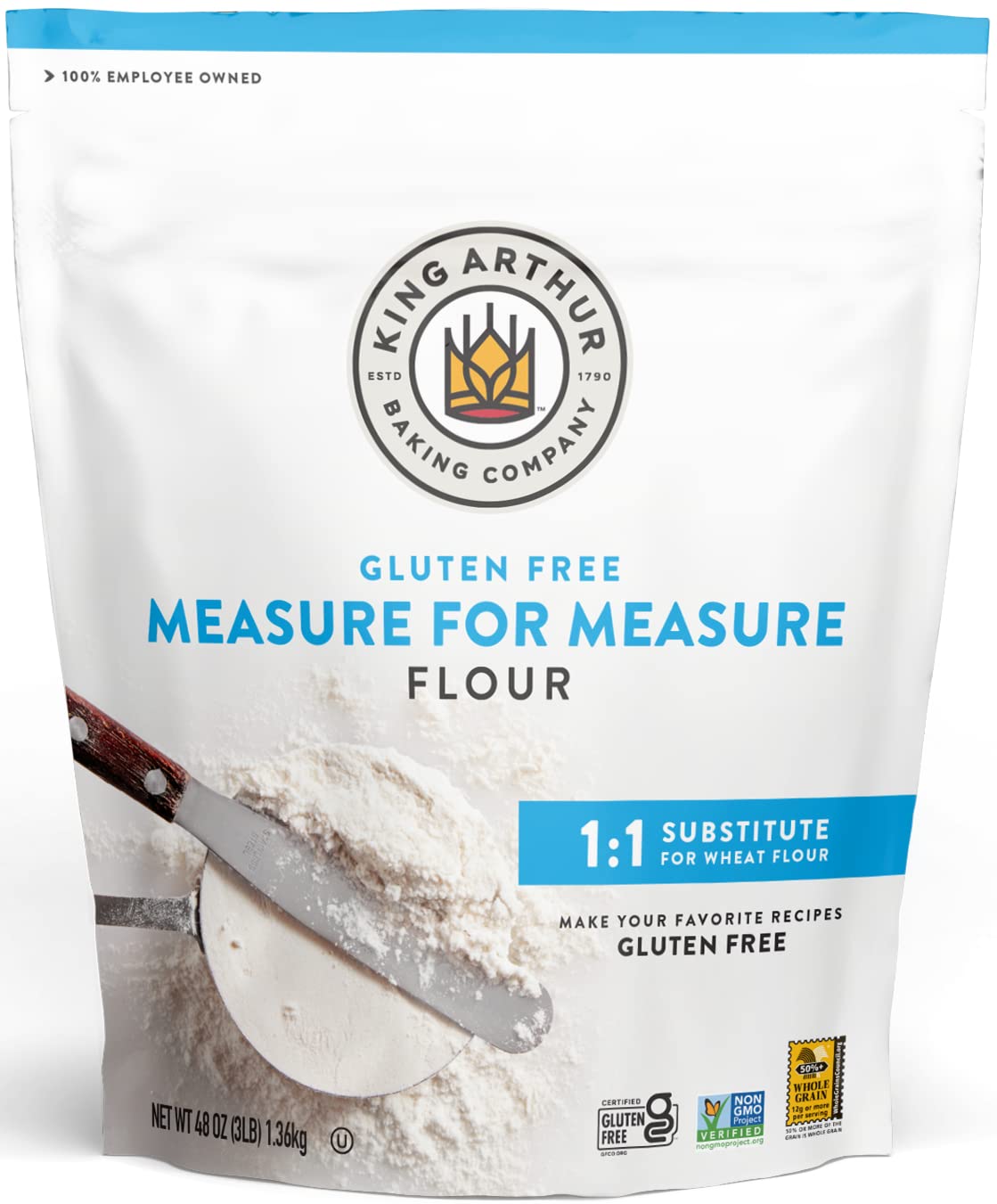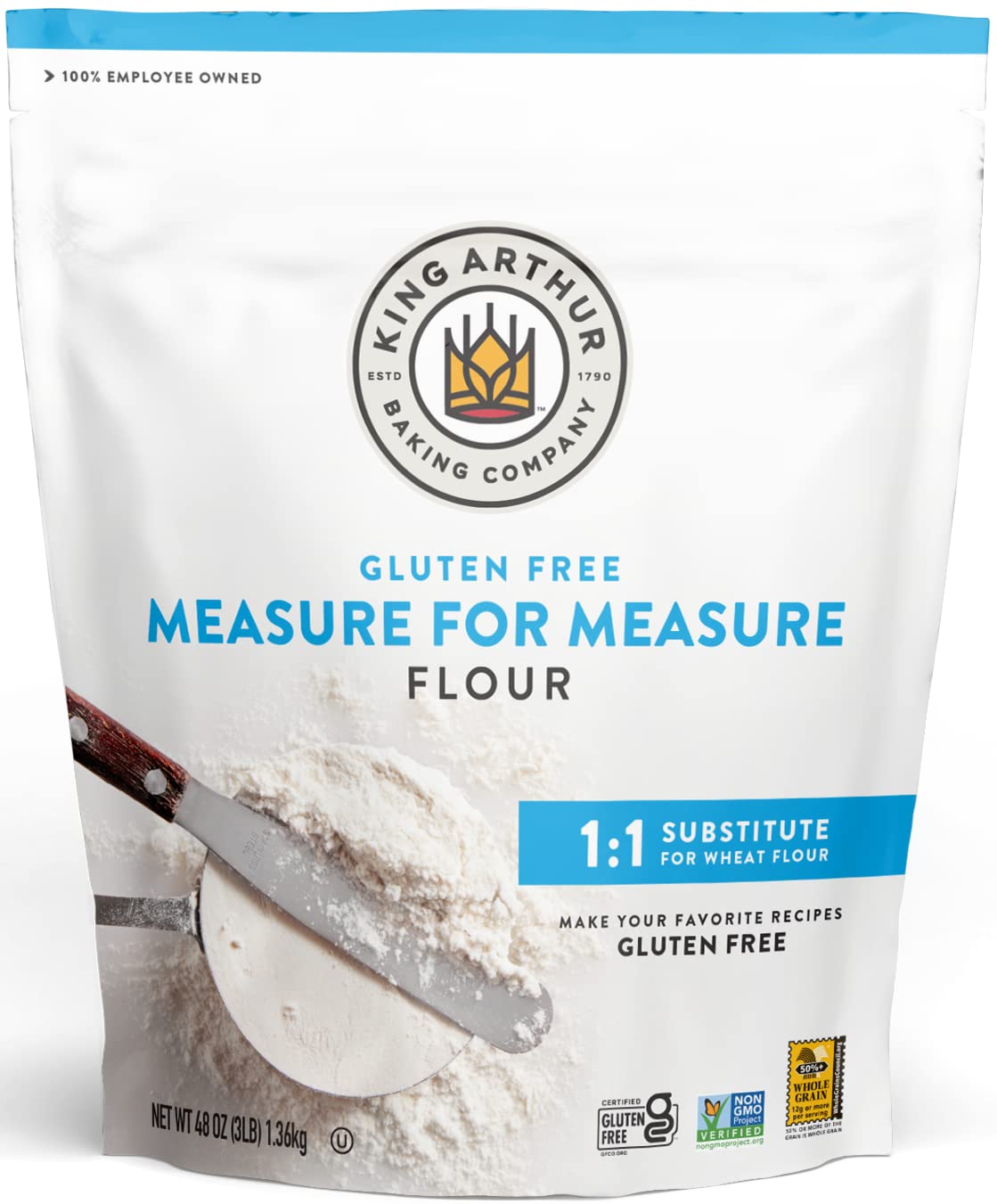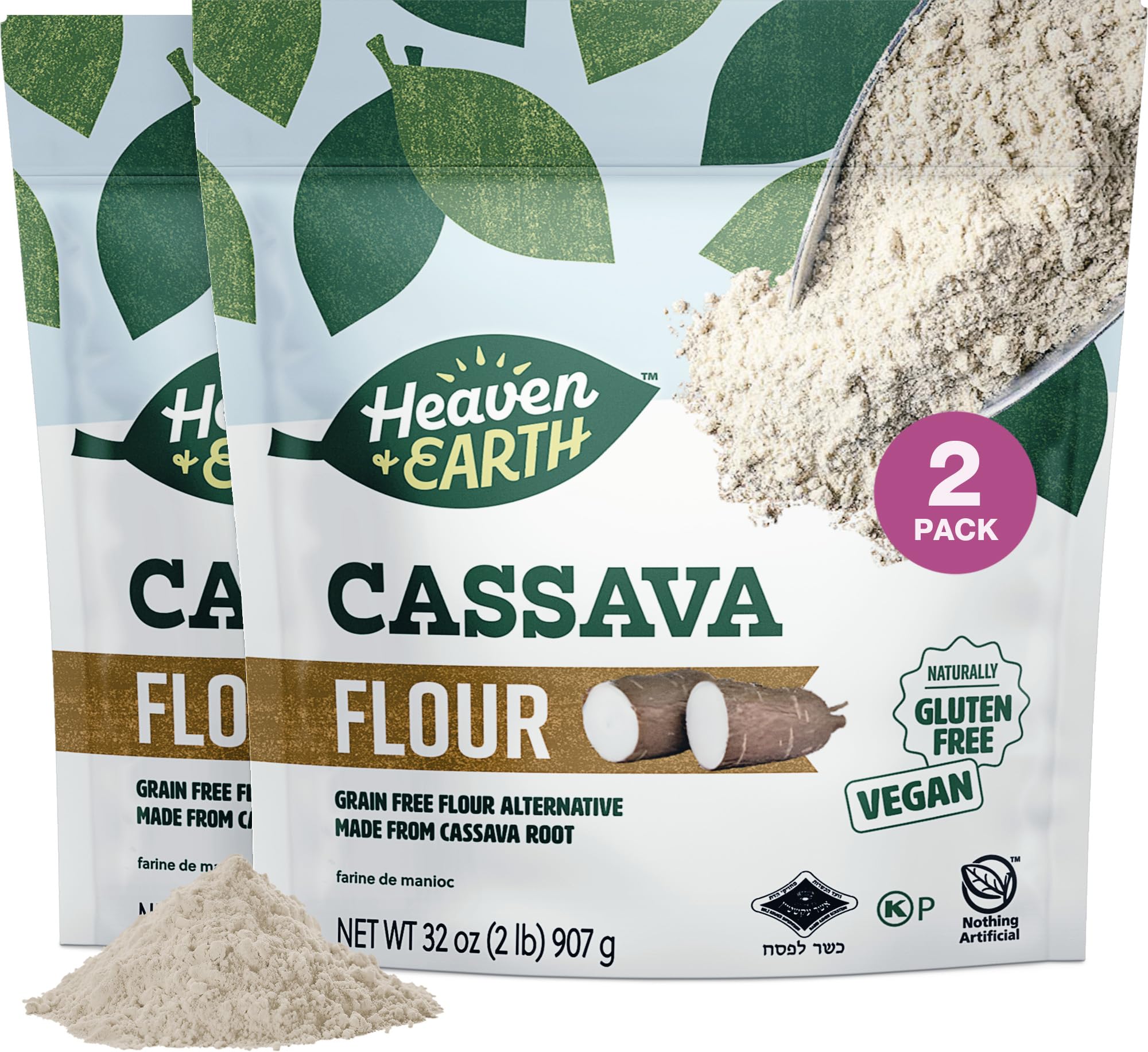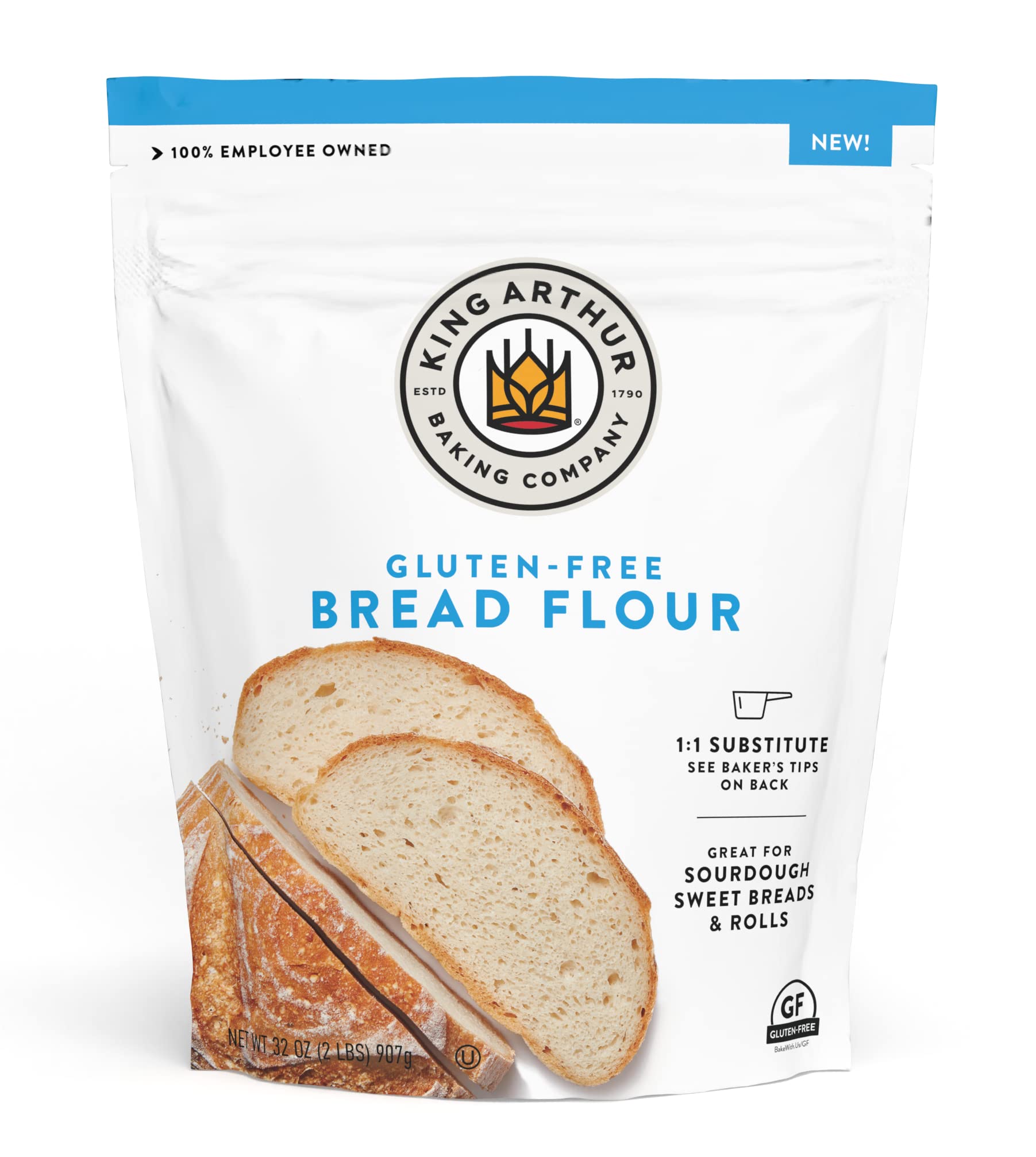In the world of gluten-free baking, grain-free flours are gaining popularity not just for dietary reasons but also for their unique flavors and nutritional benefits.
These flours are often derived from nuts, seeds, or root vegetables, each bringing a distinct taste and texture to baked goods.
From almond flour to coconut flour, these alternatives provide varied options for those looking to avoid traditional grain-based flours while exploring new culinary possibilities.
Cleanest Grain-Free Flours for Gluten-Free Baking
When you’re diving into gluten-free baking, finding the perfect flour is key.
With various grain-free options, you can enjoy delicious baked goods without the gluten.
These flours will help you maintain a natural, healthy lifestyle while expanding your culinary creations.
King Arthur Gluten-Free Flour
If you’re after a consistent and versatile gluten-free flour, this non-GMO, nutrient-fortified option is worth considering.
- An excellent 1:1 wheat flour substitute
- Nutrient-rich with vitamins and minerals
- Respected brand with tested quality
- Not ideal for yeast-based recipes
- Can be slightly more expensive
- May need storage in cool places
Diving into gluten-free baking? This flour from King Arthur allows you to seamlessly swap out wheat flour in non-yeasted recipes, perfect for cookies, cakes, and muffins.
It’s fortified with essential nutrients like calcium and iron, so you’re not missing out on nutrition while keeping your diet gluten-free.
The convenience factor is enhanced by its resealable bag, which preserves freshness.
Whether you bake frequently or are just starting out, having this in your pantry can make your gluten-free journey more enjoyable and less daunting.
As an employee-owned company with a strong commitment to quality, King Arthur provides a guarantee that you will enjoy your baking results.
Just remember to store it properly for maximum freshness and satisfaction.
Heaven & Earth Cassava Flour
If you’re seeking a clean, gluten-free, and grain-free flour, Heaven & Earth Cassava Flour is a solid choice for your baking needs.
- Naturally free from gluten and grains
- Versatile 1:1 wheat flour substitute
- Smooth, mild flavor
- Limited bulk options
- Single product review to rely on
- May not suit all dietary plans
This cassava flour acts as a wonderful alternative to traditional wheat-based options, being both gluten and grain-free.
Made from the cassava root, it brings a mild taste and flexible use, perfect for everything from fluffy cakes to hearty tortillas.
What sets this flour apart is its ease of substitution.
Simply swap this flour in a 1:1 ratio in your recipes and enjoy similar textures you’re used to with wheat flour.
Whether you’re crafting your favorite desserts or need a consistent baking companion, its adaptability is a valuable feature.
While the product holds promise with its high ratings and clean ingredient profile, the limited user feedback could be a drawback.
If you’re open to trying new alternatives in pursuit of an all-natural lifestyle, this cassava flour might be worth considering.
Bob’s Red Mill Gluten Free 1-to-1 Baking Flour
This gluten-free flour is a fantastic pick for those who want to bake without changing up their favorite recipes.
- Easy to substitute for all-purpose flour
- Offers consistent quality
- Specially formulated to work without extra ingredients
- Higher price point
- Some packaging issues reported
- May not perfectly mimic regular flour texture
Bob’s Red Mill Gluten Free 1-to-1 Baking Flour is crafted with the intention of replacing traditional flour seamlessly.
You don’t have to worry about hunting down specialized recipes or extra ingredients just to bake your favorite treats.
Its formulation includes xanthan gum, which works wonders in cookies, cakes, and more.
A significant advantage is the consistent quality it provides.
Many users find it reliable whether whipping up a batch of muffins or trying to perfect gluten-free pancakes.
The quality assurance is backed by a dedicated gluten-free facility, which means you’re getting a safe product you can count on.
There are a few things to be mindful of, including the cost.
While it offers great benefits, the price is on the higher side compared to typical flours.
Additionally, there have been occasional reports about packaging, so it’s worth checking your order when it arrives.
King Arthur Gluten-Free Bread Flour
This King Arthur flour might be the right choice if you’re looking to make gluten-free yeasted recipes with great taste and texture.
- Adapts well to classic yeasted recipes
- Rises faster than traditional wheat-based dough
- Trusted by a long-standing brand
- Contains gluten-free wheat starch, which might not be suitable for severe allergies
- May need adjustments in liquid and rising time
- Produced in a facility that processes wheat
King Arthur Gluten-Free Bread Flour opens a new dimension of baking for those following a gluten-free lifestyle.
If you enjoy making artisanal breads like boules or bagels, this product promises to lift your baking spirit.
The blend of gluten-free wheat starch and sorghum flour gives your breads a commendable flavor and texture.
However, keep in mind that it’s best to tweak your recipes slightly—adding a bit more liquid and adjusting proofing times.
This flour rises about 50% faster than regular dough.
King Arthur’s heritage and trusted quality make this product attractive for both newcomers and seasoned gluten-free bakers.
Just be cautious about allergies due to the presence of wheat starch, and always store it properly to maintain freshness.
Otto’s Naturals Cassava Flour
If you’re seeking a versatile, grain-free flour for various recipes, then this one is worth considering for its adaptability and taste.
- Made from pure, non-GMO yuca root.
- Works well as a 1:1 wheat flour substitute.
- Offers a neutral flavor blending seamlessly with other ingredients.
- Packaging issues have been reported.
- May require mixing with softer flours for some recipes.
- Higher price point compared to other flours.
This flour’s smooth texture makes it an appealing choice for gluten-free cooking.
By using Otto’s Naturals Cassava Flour, you can easily create a wide range of baked goods without sacrificing texture or flavor.
Its neutral taste sets it apart, allowing your other ingredients to shine.
While known for quality, some users have mentioned packaging concerns, so consider this if you’re planning to buy large quantities.
Incorporating this flour into your baking routine can help maintain your gluten-free lifestyle with ease.
Though it may cost a bit more, the quality and versatility you get make it a valuable addition to your pantry.
Buying Guide
When choosing grain-free flours for gluten-free baking, consider a few key factors to ensure you pick the best product for your needs.
Ingredients: Look for flours with simple, clean ingredients.
Avoid products containing additives, preservatives, or fillers.
Texture: The texture of the flour is crucial for baking.
Light, fine flours often work best for pastries and cakes, while coarser flours might be suitable for bread or hearty cookies.
Nutrient Profile: Check the nutritional information to find a flour that suits your dietary requirements.
Some flours are protein-rich, while others might be high in fiber or specific vitamins and minerals.
Price: Budget can play a huge role in your decision.
Compare prices per pound or kilogram to find a cost-effective option.
Keep in mind that specialty flours can sometimes be more expensive.
Allergen Information: If you have specific allergies, check the allergen statements carefully.
Some grain-free flours might still share facilities with allergens.
Availability: Depending on where you live, availability can be a factor.
See if the flour is easily accessible at local stores or online.
Purpose: Think about what you plan to bake.
Some flours work better for certain recipes.
Almond flour might be great for moist desserts, while chickpea flour suits savory dishes.
Flour Comparison
| Flour Type | Texture | Protein | Fiber |
|---|---|---|---|
| Almond | Fine | High | Low |
| Coconut | Coarse | Medium | High |
| Cassava | Smooth | Low | Medium |
| Chickpea | Slightly Coarse | High | Medium |
Frequently Asked Questions
Exploring gluten-free baking opens up a world of delicious possibilities with flours like almond and coconut.
These flours cater to a variety of baking needs including cookies and bread, all while being free of gluten and grains.
What are the top gluten-free flours for homemade cookies?
Almond flour is a fan favorite for making cookies because of its nutty flavor and soft texture.
Coconut flour is also popular, offering a subtle sweetness while being naturally gluten-free.
For a lighter option, try using chickpea flour, which can add a slight earthy flavor that works well with chocolate or vanilla.
Which gluten-free flour is best for bread recipes?
For bread, you might want to grab sorghum flour thanks to its hearty texture and taste.
Buckwheat flour also works wonders, offering a rich and full-bodied flavor.
If you’re looking for something with a bit more elasticity, tapioca flour can be an excellent addition to gluten-free bread recipes.
Can you give me a list of gluten-free flours safe for baking?
Certainly! Some go-to choices include almond flour, coconut flour, rice flour, tapioca flour, and buckwheat flour.
Arrowroot and potato starches are also commonly used.
Each offers different textures and tastes, so experimenting can help you find the perfect match for your baking projects.
What’s the healthiest alternative to traditional flour for baking?
Many folks turn to almond flour because it’s full of healthy fats and protein while being low in carbs.
For fiber enthusiasts, coconut flour is a great option.
If you’re looking to bake with fewer calories, trying millet flour might be a good route as it is less calorie dense.
Are there any grain-free flours that are also gluten-free?
Yes, almond flour and coconut flour are both grain-free and gluten-free, making them excellent choices for paleo diets.
Besides these, cassava flour is another great option, offering a closer texture to traditional wheat flour without any grains or gluten.
Got any tips for baking with gluten-free flours?
When baking with gluten-free flours, remember they often need binders like eggs or xanthan gum to hold things together.
Adding extra moisture with ingredients like applesauce or yogurt can help too.
It might also take some trial and error to get the perfect texture, so don’t be afraid to experiment!






